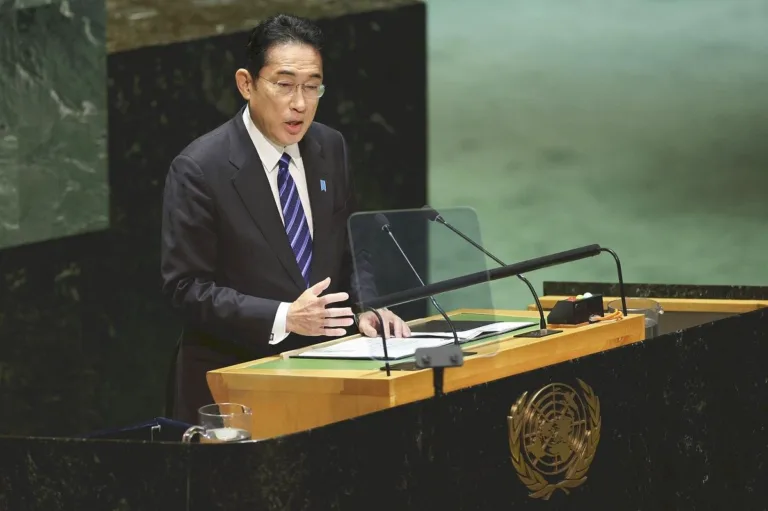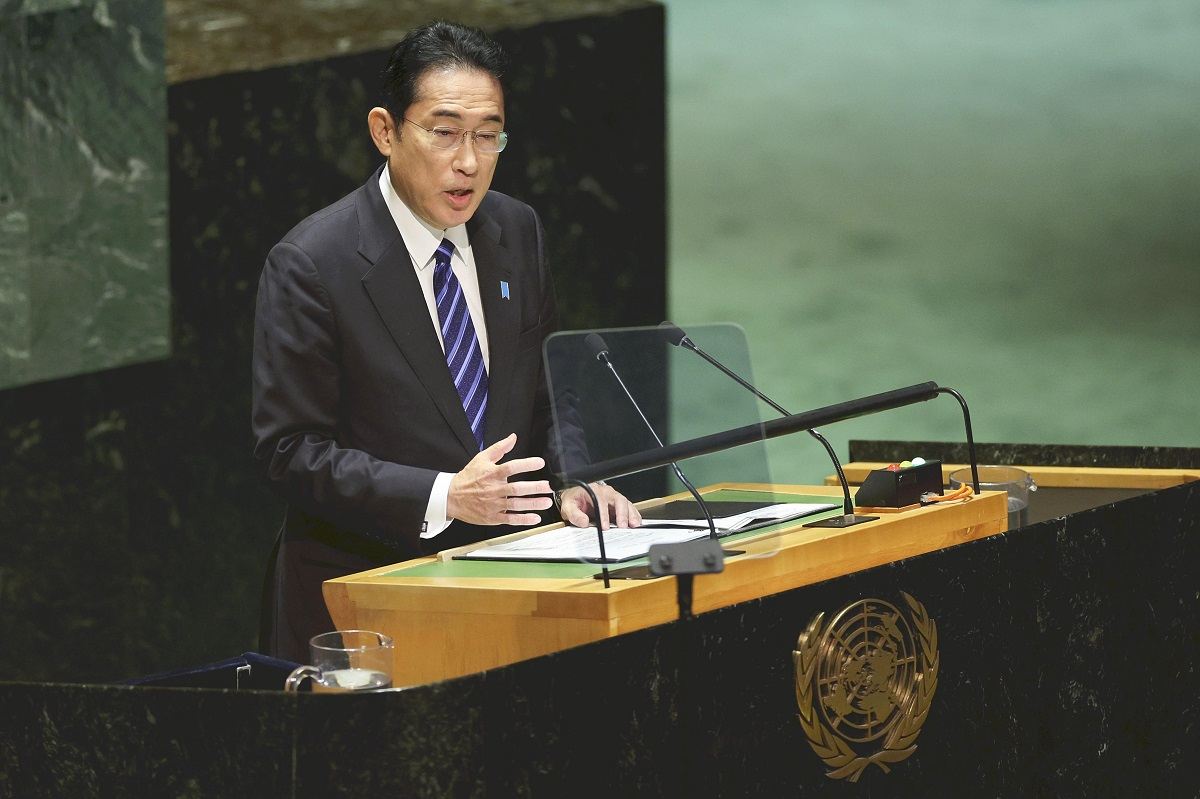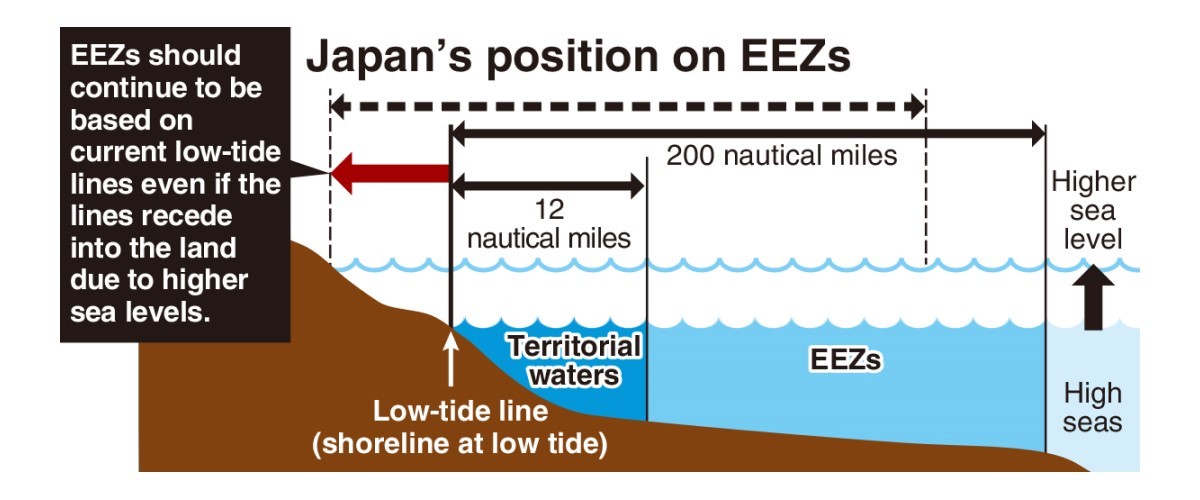
Japanese Government Calls for New Interpretation of UNCLOS to Protect Exclusive Economic Zones Amid Rising Sea Levels
Japan’s Bold Move to Address the Threat of Global Warming

Prime Minister Fumio Kishida speaks at the U.N. General Assembly session on Sept. 19.
In a groundbreaking step, the Japanese government has urged the international community to adopt a fresh interpretation of the U.N. Convention on the Law of the Sea (UNCLOS). The goal is to safeguard current exclusive economic zones (EEZs) faced with the peril of rising sea levels caused by global warming.
Leading the Global Debate and Strengthening Pacific Island Cooperation
By calling for the preservation of existing low-tide lines that determine EEZs, Japan aims to assume a leadership role in the international dialogue on this critical issue. Moreover, this move seeks to bolster collaboration with Pacific island nations directly threatened by mounting sea levels.
UNCLOS: The Supreme Law of the Sea
UNCLOS, widely acknowledged as the supreme legal framework governing territorial waters, EEZs, and continental shelves, serves as the cornerstone of international maritime law. Enacted in 1982 and effective since 1994, this crucial convention boasts ratification by 168 countries, including Japan and European Union members.
Prime Minister Kishida Champions the Cause
During his recent address at the U.N. General Assembly session on September 19, Prime Minister Fumio Kishida made a resounding declaration, expressing his support for maintaining current low-tide lines, as dictated by UNCLOS, even if coastlines recede due to rising sea levels.
This unprecedented mention of the rising sea levels issue on such a global platform emphasizes the necessity of reinterpreting the convention, which did not anticipate this predicament upon its adoption.
Implications for Exclusive Economic Zones (EEZs)
Under the provisions of UNCLOS, signatory nations enjoy exclusive rights to exploit natural resources, engage in fishing activities, and pursue other maritime interests within their designated EEZs, extending up to 200 nautical miles (approximately 370 kilometers) from their low-tide lines.
Unfortunately, the convention fails to address the specific circumstances arising from coastlines retreating inland due to rising sea levels. To address this potential loophole, the U.N. International Law Commission (ILC) formed a working group in 2019 to initiate discussions on how to approach this critical matter.
Possible Consequences and Challenges
Should the starting point of the 200 nautical miles be determined based on the receded low-tide lines, the landward movement of EEZs would result in a reduction of areas where countries can exercise rights to develop natural resources and engage in fishing activities.
Conversely, if EEZs are fixed according to current low-tide lines, the vast expanses of the high seas would remain unaffected by rising sea levels. This scenario, however, could evoke perceptions of unfairness among nations seeking to expand their endeavors in these international waters.

Pioneering Japan’s Viewpoint
As an initial step, the Japanese government expressed its stance in February, asserting that the current low-tide lines should serve as the basis for EEZs. With Japan boasting the world’s sixth-longest shoreline stretching approximately 35,000 kilometers and possessing one of the largest EEZs, this issue is deemed of vital importance in safeguarding maritime interests, as highlighted by a senior Liberal Democratic Party official.
Strategic Partnerships in the South Pacific
Notably, Japanese authorities believe this initiative will foster increased collaboration with South Pacific island nations. These islands serve as a strategic stronghold, where powerful nations like the United States and China are competing for influence. Foreign Minister Yoshimasa Hayashi conveyed Japan’s policy to a delegation from the Pacific Islands Forum during their visit in February.
Japan’s Aspirations and Diplomatic Efforts
The Japanese government aspires to contribute to global measures against rising sea levels. By fulfilling the expectations of island nations, it seeks to consolidate support from an expanding coalition of countries sharing Japan’s policy stance. To achieve this, Japan plans to actively communicate its viewpoint during a forthcoming U.N. meeting in the autumn.
Professor Masahiko Asada, an expert in international law at Kyoto University and a member of the ILC, highlights the necessity of unanimous consent among signatories to establish a new interpretation of the law. Therefore, Japan is anticipated to strive for a unanimous resolution through various signatory meetings and other opportune occasions.